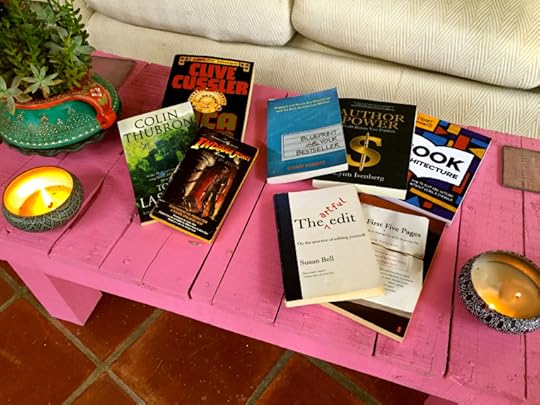Editing: Onwards, and Then Onwards Some More
With the second of what I hope will be a total of three edits for Book I of my upcoming series now complete, it’s time to take a break from the desk and do some research. A commonly used phrase for writers of any genre is the first draft is easy, or some form of the same sentiment, and although it is never easy to complete a manuscript, it is perhaps easier than the subsequent editing of drafts.
So, after a round of editing is complete, I find it really useful to step away from the manuscript for a while, and instead spend my time researching, both for extra inspiration for the novel itself, but more important for me is to learn from others who know what they’re doing in terms of the theme and structure of a book far better than I do.
It’s perhaps obvious, but this simple statement is true: Writing is easy. Writing well is not.

Shown here are some of the books that will help shape my project. Firstly, on the left are the story and style inspirations. Indiana Jones speaks for itself. A classic adventure, with one central protagonist, if this doesn’t inspire my novels, nothing well. I really admire Clive Cussler. His epic adventures are a little far fetched, but he writes with such pace and adrenalin that I hope to incorporate some of the feel of Inca Gold into my books. Although I didn’t like Clive Thubron’s To The Last City that well, I did enjoy the descriptive way he puts you right there in the jungle. Since a lot of my story takes place in a similar geographical destination, I know I can learn from him. I’ve read it once, and I will now read it again in an effort to absorb his descriptive skill.
On the right are the books that I’m sure will help me from the technical side of writing. I was lucky enough to have sat in a lecture by Stuart Horwitz at the San Miguel Writers’ Conference in February, and even luckier to hang out with him at the after party. The guy was super generous with his time, and I learned a lot from simply chatting to him. However, I won one of his books on writing in the lecture, Book Architecture, and bought another from the store, Blueprint Your Bestseller, and upon cursory examination I firmly believe that his knowledge and skill, when implemented into my own work, will help turn what could be a good story into a great one. I also met the lovely Lynn Isenberg, and just speaking with her at the conference was inspiring enough. Such energy and passion can only be good for my writing, and Author Power, her bestselling guide to empowering authors, is sure to work wonders for me too. Susan Bell’s The Artful Edit is, quite simply, a masterclass on the notoriously difficult challenge of editing. I’ve read it 3 times so far, and I will not begin the third and final edit of Book I until I’ve completed it again. I cannot recommend it highly enough to anyone writing a novel. Next to that is the excellent The First Five Pages. Again, it is obvious, but if a reader isn’t drawn into your story within the first few pages, they probably aren’t going to read the next five. Noah Lukeman’s succinct and practical guide is an excellent resource.
So that’s what I’ll be doing for the next week or two. Reading, taking notes and being inspired to make my next book, I hope evocatively entitled ‘The Condor Prophecy’, as good as it can possibly be.
I’d be delighted to hear what books inspire you in your writing, or any other valuable resources you’d recommend to a guy still very much learning his craft.
Cheers,
Steven
Filed under: Books, fiction, Indie author, novelist, Steven Moore Author, Uncategorized, work in progress, writer Tagged: adventure, editing, FICTION, Hiram Kane III, Indie Author, Lynn Isenberg, Stuart Horwitz, Susan Bell, The Condor Prophecy











